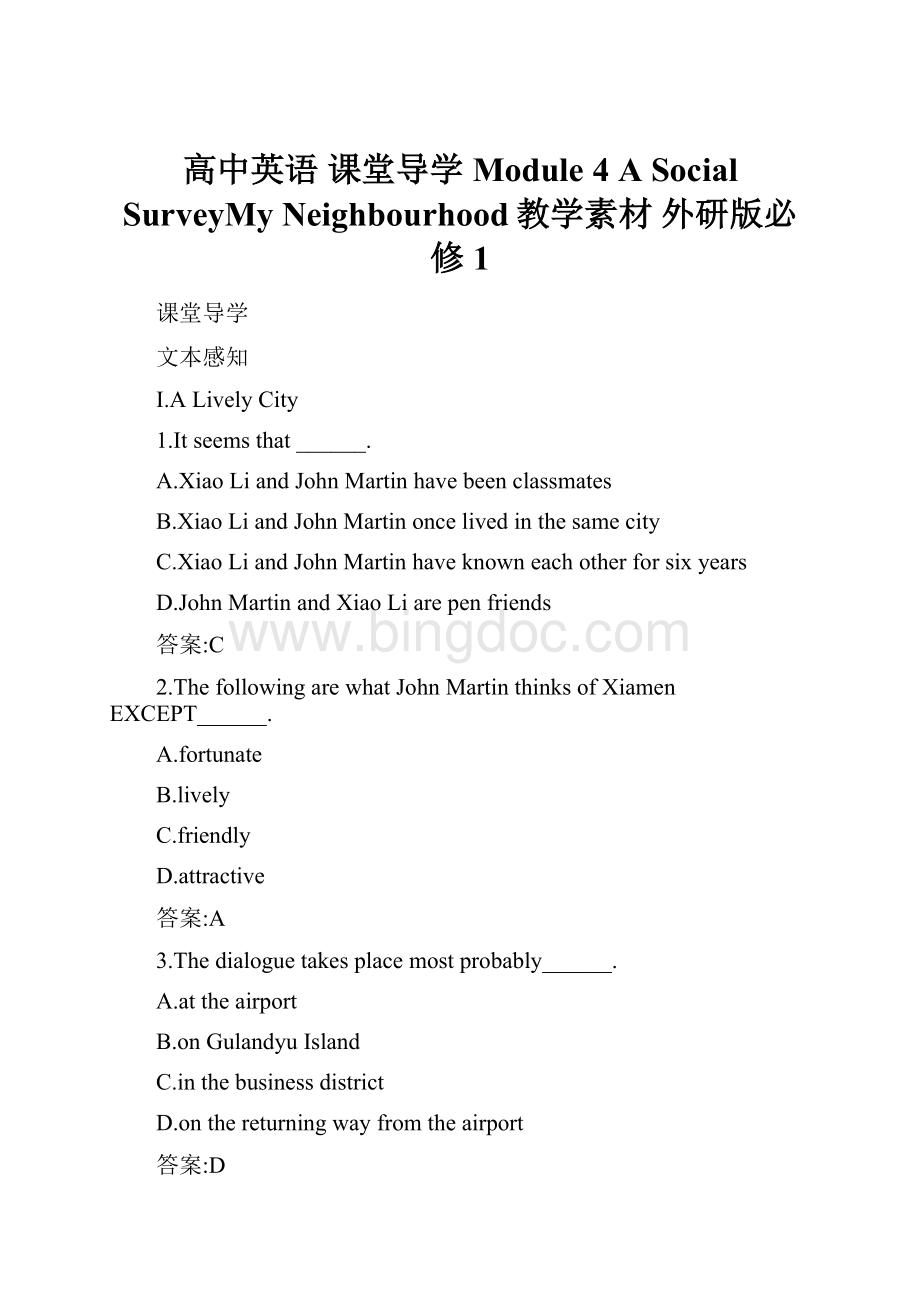高中英语 课堂导学Module 4 A Social SurveyMy Neighbourhood教学素材 外研版必修1.docx
《高中英语 课堂导学Module 4 A Social SurveyMy Neighbourhood教学素材 外研版必修1.docx》由会员分享,可在线阅读,更多相关《高中英语 课堂导学Module 4 A Social SurveyMy Neighbourhood教学素材 外研版必修1.docx(29页珍藏版)》请在冰点文库上搜索。

高中英语课堂导学Module4ASocialSurveyMyNeighbourhood教学素材外研版必修1
课堂导学
文本感知
Ⅰ.ALivelyCity
1.Itseemsthat______.
A.XiaoLiandJohnMartinhavebeenclassmates
B.XiaoLiandJohnMartinoncelivedinthesamecity
C.XiaoLiandJohnMartinhaveknowneachotherforsixyears
D.JohnMartinandXiaoLiarepenfriends
答案:
C
2.ThefollowingarewhatJohnMartinthinksofXiamenEXCEPT______.
A.fortunate
B.lively
C.friendly
D.attractive
答案:
A
3.Thedialoguetakesplacemostprobably______.
A.attheairport
B.onGulandyuIsland
C.inthebusinessdistrict
D.onthereturningwayfromtheairport
答案:
D
4.Whatdoesn’tXiaoLilikeaboutXiamen?
A.Hotandwetweather.
B.Toomanytourists.
C.High-risebuildings.
D.Greatshoppingmalls.
答案:
B
5.Ifyouwantthedialoguedevelops,what’sthetalkingtopicforthefollowingdialogue?
A.thefoodofXiamen
B.thebeautifulsceneryofXiamen
C.theweatherofXiamen
D.thetouringindustryofXiamen
答案:
A
Ⅱ.CULTURALCORNER
1.What’sthebesttitleofthispassage?
A.CountrysideIsChanging
B.LookingforJobs
C.VillageProblems
D.TheLifeofCountrysideandTown
答案:
C
2.Whichof
thefollowingstatementsisnotthereasonwhysomevillagesaredisappearing?
A.Peoplegotothecitiestofindworkandneverreturn.
B.Youngpeopleleavetheirvillagesformoresuitablelife.
C.Thepricegoesupandpeoplec
an’taffordtobuyhouses.
D.Manyfarmersselltheirlandtofindanotherjob.
答案:
C
3.Whydosomeoftheurbanpeoplechoosetoliveinthevillages?
A.Becausetheywanttolivethereattheweekends.
B.Becausetheycan’taffordtobuyhousesinthecity.
C.Becausetheywereborninthecountryside.
D.Becausetheywantthevillagestoremain.
答案:
B
4.What’stheattitudeofthewritertowardstheproblemsofvillages.
A.Optimistic(乐观).
B.Concerned.
C.Objective(客观).
D.Hopeless.
答案:
B
5.Thispassageiswritten______.
A.inpersuadingwords
B.bygivingexamples
C.byanalyzingandconcluding
D.fromthewriter’spersonalfeelings
答案:
C
难句透视
1.It’sbeensixyearssincewelastsaweachother,youknow.
你知道,我们已经六年没见了。
剖析:
这是一个Ithas/is+时间阶段+since...句式。
意为“自从……以来已有某段时间了”。
since引导的是时间状语从句,要注意,在这个时间状语从句中,谓语动词一般是瞬间动词的过去式。
2.Andthisisthefirsttim
eI’vevisitedyourhometown.
这是我第一次参观你们的家乡。
剖析:
I’vevisitedyourhometown是定语从句。
先行词是time,被序数词thefirst修饰,定语从句的引导词要用that;而且从句中的时态要用完成时。
that由于作visited的宾语,所以已省略。
3.I’veseenquitealotofChinaandI’vevisitedsomebeautifulcities,butthisisoneofthemostattractiveplacesI’vebeento.
我已经看了中国的很多地方,我也参观了几个美丽的城市,但这是我到过的最吸引人的地方之一。
剖
析:
I’vebeento是定语从句,要注意这个定语从句的先行词是places而不是one。
如果先行词是one,前面常有theonly(惟一的),thevery(正是……)修饰。
4.Ifeelveryfortunatelivinghere.
生活在这里我感到很幸运。
剖析:
fortunate是形容词,意为“幸运的”,作系动词feel的表语;livinghere是现在分词短语,作状语。
5.What’stheclimatelike?
那里的气候怎么样?
剖析:
这是一个Whatis/are...like?
句式,用来询问对方对某人或某物的评价,要注意区分与Howdoyoulike/find...?
的区别。
前者询问的是某人或某物比较稳定的性质和特点;后者询问的是易变化的东西。
6.Prettyhotandwetinthesummer,butitcanbequitecoldinthewinter.
夏天很热很潮湿,但是冬天很冷。
剖析:
pretty在此句中作副词用,意为“非常”,相当于very。
7.SoundsOKtome.那对我没什么。
剖析:
这是一个省略句,完整的形式是:
ThatsoundsOKtome.OK作系动词sounds(听起来)的表语。
8.Don’ttheybotheryou?
他们不会给你添麻烦吧?
剖析:
Don’tthey...?
是一个否定形式的疑问句,常常是试探性地问对方,有时译为“难道不是……吗?
”。
如:
Haven’tyouheardofthenews?
难道你没有听到这个消息吗?
bother此处表示“给某人添麻烦”。
9.Yes,theycanbeanuisanceinthesummerbecausetherearesomanyofthem.
是的,在夏天他们是够令人讨厌的,因为太多了。
剖析:
can在此句中表示理论上的可能性,不涉及具体的时间或场合;many修饰复数名词时的语序是many+复数名词,如manytourists。
但如果many与人称代词连用或复数名词前有限制词,后面要接介词of,如manyofthetourists;manyofyou;manyofthoseapples。
10.Youdon’treallyseetouristswhereIlive.
在我住的地方你看不到游客。
剖析:
whereIlive是地点状语从句,意为“在我居住的地方”。
11.IsthatGulangyuIsland,justacrossthewater?
那是鼓浪屿吗?
在水的那边?
剖析:
across表示“在……的对面”。
再如:
Helivesacrossthestreet.他住在街道对面。
12.Sotheytellme.他们也是这么跟我说的。
剖析:
这是一个“So+主语+谓语”的句式,相当于Theydidtellmeofthat.
13.Ilovecities,buttherearetimeswhenIneedtogetoutintothecountrysideandgetawayfromthenoise,thedirtandthepeople.
我喜欢城市,但是有时我需要到乡下,远离噪音、尘埃和人群。
剖析:
“whenIneedtogetoutintothecountrysideandgetawayfromthenoise,thedirtandthepeople”是表示时间概念的定语从句,修饰times。
getawayfrom意为“摆脱”。
14.Secondly,peoplemovetothecitiestofindwork,asthereareoftenveryfewjobsinthecountryside.
其次,人们到城市寻找工作,因为在乡村工作很少。
剖析:
secondly用于进行列举,意为“第二”;“第一”用firstly表达;asthereareoftenveryfewjobsinthecountryside是原因状语从句,意为“由于……”;veryfew意为“几乎没有”后加可数名词复数,very还可修饰little意为“没有多少”后加不可数名词。
例如:
verylittletime。
要点解读
一、词汇详解
1.soundvi.听起来
【典型例句】
Herexplanationsoundsallright(tome).
她的解释(在我听来)似乎没有问题。
Thatsoundsasifyou’renotgoingtotakethejob.
听起来你不准备接受这份工作。
Yourvoicesoundslikethatofalion.
你的声音听起来像是狮子在吼。
【知识小结】
sound作系动词用时,后接形容词、like介词词组作表语或asif表语从句,也常用“SoundsOK/good”等表示同意对方的建议;没有被动形式。
【相关链接】
(1)sound的其他意义及用法
①n.音,响声
Weheardsoundsoflaughterfromthenextroom.
我们听到隔壁房间传来的阵阵笑声。
②vi.发声,响起;发音
Atthismomenthisfootstepssoundedonthestairs.
这时候传来了他走在楼梯上的脚步声。
③vt.被弄响,被吹奏;使发声,使响起
Hesoundedhishorntowarntheotherdriver.
他按喇叭提醒对方司机。
④其他感官动词也可用作系动词,用法与sound相同。
例如:
feel觉得;摸起来有……感觉
look看起来 smell闻起来 taste尝起来
单项填空
(1)—Whatanoise!
Icanhardlystandit.
—It______asiftheyarehavingapartynextdoor.
A.looks
B.sounds
C.feels
D.happens
提示:
句意:
“太吵了,我受不了。
”“听起来好像是邻居在举行宴会。
”Itsoundsasif听起来好像是……,与上一句中的noise在语意上相符。
答案:
B
(2)Thiskindofcloth______softand______well.
A.isfelt;issold
B.feels;sells
C.feels;issold
D.isfelt;sells
提示:
句意:
这种布料摸起来柔软,卖得很好。
feels作连系动词,,意为“摸起来……”;sell作不及物动词,意为“卖起来……”,后接副词表示状况。
这两个词都不能用于被动语态。
答案:
B
2.bothervt.打扰;烦扰;麻烦
【典型例句】
“Don’tbotheryourdad.He’sgotalottodotonight,”saidMother.
妈妈说:
“别打扰你爸爸,他今晚有好些事情要做。
”
Sorrytobotheryou,butcanyouexplainthelanguagepointtomeagain?
对不起,打扰了,不过你可以再给我解释一下这个语言点吗?
Hecomesbotheringmedayafterday.
他天天来烦扰我。
Pleasedon’tbothertogetup.
您就别费事了,不用起来了。
【相关链接】
bother构成的短语bother(oneself)about为……而操心;为……而费事
botherwithtrifles为小事而烦恼
bothertodo费心做某事
英汉互译
(1)我现在很忙,别烦我。
__________________________________
__________________________________
(2)不用麻烦去照料它了。
随它去吧。
__________________________________
__________________________________
(3)Youneedn’tbothertorewriteit.Justmakecorrectionsintheoriginaltext.
__________________________________
__________________________________
答案:
(1)I’mverybusynow.Don’tbotherme.
(2)Don’tbothertolookafterit.Leaveitalone.
(3)你不用麻烦重写了,在原文上修改就行了。
3.nuisancen
.令人讨厌的人或事
【典型例句】
Don’tbesuchanuisance!
别这么讨厌!
Itwasagreatnuisance.它讨厌极了。
Thisboyisanuisanceinclass.
这个男孩是班上的捣蛋鬼。
Hewasnothingbutanuisanceandarascal.
他是一个十足的讨厌鬼和恶棍。
【知识小结】
nuisance是可数名词,前面要用不定冠词,表示“一个讨厌的……”。
汉泽英
(1)真讨厌,我忘记带票了。
__________________________________
__________________________________
(2)不得不排队真讨厌。
__________________________________
__________________________________
答案:
(1)Whatanuisance!
I’veforgottenmyticket.
(2)Havingtostandinlinewasanuisance.
4.putup修建
【典型例句】
Theyareputtingupseveralnewbuildingsinthatblock.
他们正在那一街区建几幢楼房。
AnewrailroadhasbeenputupbetweenQinghaiandTibet.
青藏铁路已修建好了。
【相关链接】
(1)putup的其他常见意义及用法:
①举起;搭起;支起;建起
Putyourhandsup.举起你的手。
Severaltentshavebeenputuptoaccommodatetheparty.
搭起了几个帐篷来给这一行人住。
②为……提供住宿
Sinceit’slate,we’llputyouupforthenight.
因为太晚,我们请你今晚就住在这里。
③提出建议
I’dliketoputupanideaforyourconsideration.
我想提个意见供你考虑。
(2)put短语
putaside节省(钱、时间);储蓄;把……放到一边
putaway收拾起来;储存(钱);喝掉
putback时钟向后拨;放回原处;拖延
putdown写下;记下;控制
putforward提出(意见、建议);推荐;把时针向前拨
putoff延期;推迟
puton假装;增加;上演(戏剧);穿上(衣服)
putout熄灭;使忧虑;扑灭;出版
putthrough接通电话
putupwith忍受;忍耐;受苦
介副词填空
(1)Themanagerhadtoputhiswork______foratimeforanurgentaccident.
(2)Theboyputthefood______inthecupboardafterhefinishedhisdinner.
(3)Wehadtoputthemeeting______aweek.
(4)It’stimethatthegovernmentput______interestrates.
(5)Shehasdecidedtoputherself______asacandidate.
(6)Don’tput______untiltomorrowwhatcanbedonetoday.
(7)She’sbynomeansreallymad;sheputsit______inordertogainattention.
(8)Wouldyoumindputtingyourcigarette______,please?
(9)Yourcallhasbeenput______.
(10)Wecanput______tenpeopleforthenightatapinch.
(11)Thatwoman,asahousewife,hasalottoput______.
答案:
(1)aside
(2)away (3)back (4)down(5)forward (6)off (7)on (8
)out (9)through (10)up (11)upwith
5.approachvt.接近
【典型例句】
Hecarefullyapproachedthehouse.
他小心地走近那座房子。
Youmustapproachthebirdveryquietlyoritwillflyaway.
你必须悄悄地走近那只鸟,否则它会飞走的。
Thesummerisapproaching.
夏季即将来临。
【相关链接】
approach还可作名词用,意为“接近,靠近;通道,入口;方法”,常接介词to。
Snowannouncedtheapproachofwinter.
雪宣告了冬季的来临。
Ilikeherapproachtotheproblem.
我喜欢她解决这个问题的方法。
单项填空
(1)Youareallnewcomershere.Trynottomake______tostrangers.
A.ways
B.connection
C.means
D.approaches
提示:
makeapproachestosb.接近某人。
答案:
D
(2)Someexpertsoninternationaffairssuggestedapracticable______totheMiddleproblems.
A.way
B.approach
C.means
D.method
提示:
只能approach后接介词to。
答案:
B
6.occupationn.职业
【典型例句】
Teachingismyoccupation.
教书是我的职业。
—What’syouroccupation?
你的职业是什么?
—Iamapoliceman.
我是一名警察。
【相关链接】
(1)occupation还可表示“消遣;占据;居住”。
Hewasboredforlackofoccupation.
他因无所事事而感到厌烦。
Nooneisyetinoccupationofthehouse.
这所房子还没有人住进去。
(2)occupyvt.占领;占(时间/空间);占用,使某人忙碌
Readingoccupiesmostofmyfreetime.
阅读占去了我空闲时间的大部分。
Sheisoccupiedinwritinganovel.
她忙于写小说。
(3)occupation,profession,,career和employment的区别
occupation指一个人经常担任的工作,不论是否领取工资。
profession作“职业”解释时,通常指那些必须受到特殊教育及训练才可胜任,带有专业性质的工作,多为创造性